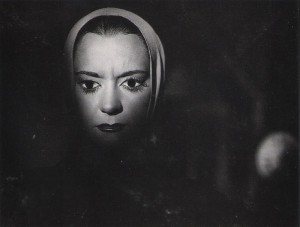
When Jean Cocteau’s Orpheus (1950) last screened locally, I wrote in part that the film was “more than a modern-dress variant of the myth, [and that] it becomes a statement about art, the art world and Cocteau’s place in it. It’s not entirely free of self-criticism, either, since Cocteau most clearly relates to the ‘too famous’ poet of the title, whose fame has won him the adulation of the public and the scorn of his peers. In that role, he allows himself to be lectured that ‘no excess is absurd,’ while taking up the challenge to ‘astonish us.’ And that’s exactly what he spends the remainder of the film doing in a series of evermore beautiful and atmospheric scenes of surrealist poetry on film. Cocteau’s vision remains unmatched, and when you see characters pass from one world to another through mirrors—via the simplest effects imaginable—you see true artistry that puts today’s CGI ‘wonders’ to shame. Few films are as magical, and none are more haunting than this monumental work.” The rest of the review is here: http://www.mountainx.com/movies/review/orpheus




Before you comment
The comments section is here to provide a platform for civil dialogue on the issues we face together as a local community. Xpress is committed to offering this platform for all voices, but when the tone of the discussion gets nasty or strays off topic, we believe many people choose not to participate. Xpress editors are determined to moderate comments to ensure a constructive interchange is maintained. All comments judged not to be in keeping with the spirit of civil discourse will be removed and repeat violators will be banned. See here for our terms of service. Thank you for being part of this effort to promote respectful discussion.